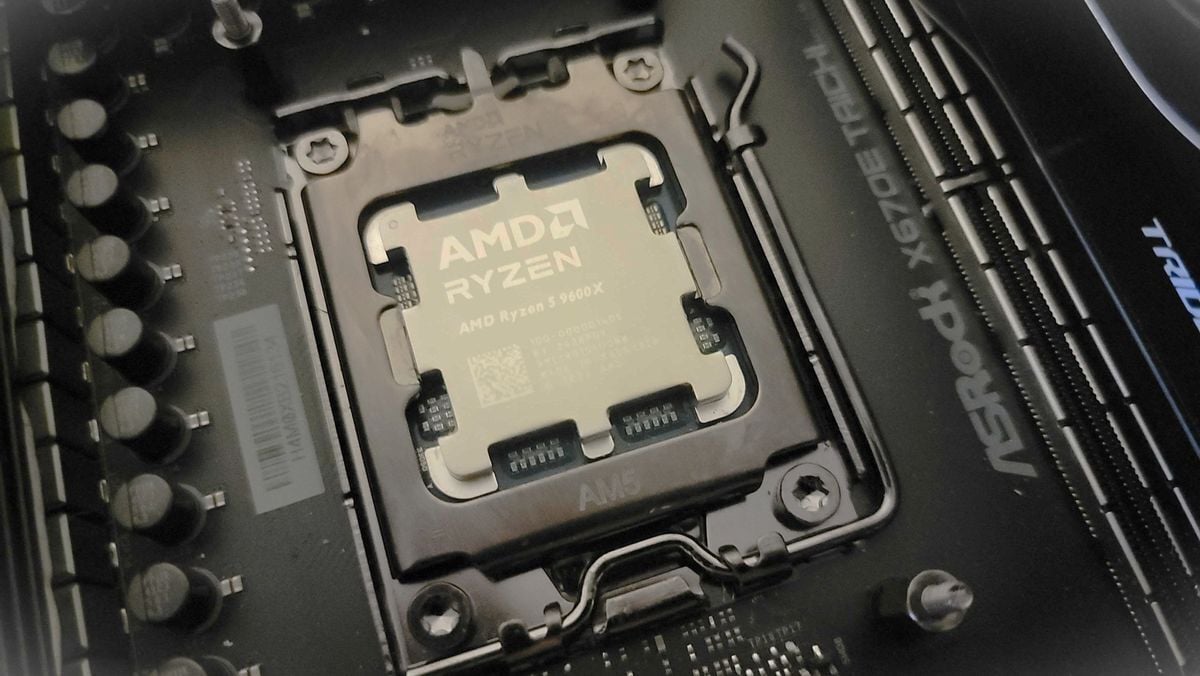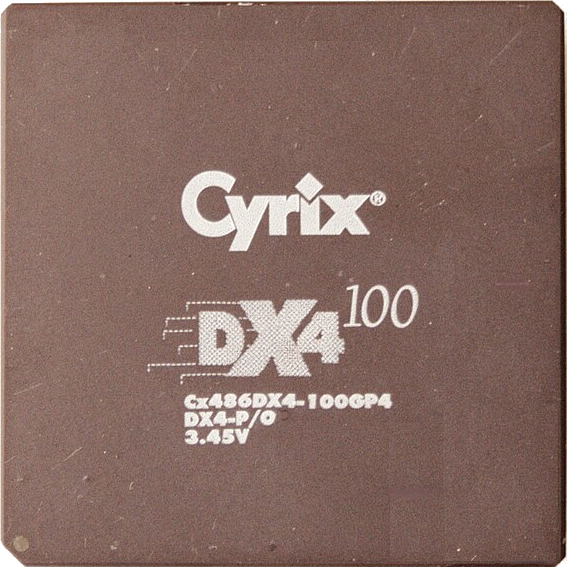Here we are - 3600 which was still under manufacture 2-3 years ago are not get patched. Shame on you AMD, if it is true.
That’s so stupid, also because they have fixes for Zen and Zen 2 based Epyc CPUs available.
Intel vs. AMD isn’t “bad guys” vs. “good guys”. Either company will take every opportunity to screw their customers over. Sure, “don’t buy Intel” holds true for 13th and 14th gen Core CPUs specifically, but other than that it’s more of a pick your poison.
Tangent: If we started buying risc-v systems we might get to a point where they can actually compete.
That’s still far away from us as a consumer standpoint, but I’m eagerly waiting for a time when I could buy a RISC V laptop with atleast midrange computing capabalities
I‘m more on the builder/tinkerer side so I‘m pretty much in starting position with risc-v now. But yes, its going to be some time before any of it is user ready as a pc.
Framework has a laptop in progress if you’re interested
Indeed I am. I‘m in posession of a working laptop but I could maybe order a riscv tablet from pine64. I already have the pinetime and the stuff is pretty awesome.
Well the Star64 from Pine is pretty good, just doesn’t have enough processing power and IO for my liking.
It is crazy efficient
I’m not buying hardware that doesn’t suit my needs as an investment hoping maybe it eventually will.
This is one of the hardest earned lessons I’ve ever learned, and I’ve had to learn it over and over again. I think it’s mostly stuck now but I still make the same mistake from time to time.
Yeah, thats the reason why we‘re in this capitalist hellhole. Perfection comes from billionaire money, nothing else.
What are you talking about perfection?
Buying something that doesn’t function is never rational.
I’m not buying hardware that doesn’t suit my needs as an investment hoping maybe it eventually will.
You were misrepresenting things. Your needs have nothing to do with things not being functional. Something can be perfectly functional and not meet someones needs. Nobody said you should buy it as an investment.
My interpretation was by far the most generous to your position, because it’s the only way it’s coherent.
If people bought [this hardware that doesn’t actually provide anything anyone can realistically use at a reasonable price] it might eventually not suck. That’s treating a current purchase as an imaginary investment in maybe eventually being able to buy something useful.
My interpretation was by far the most generous to your position, because it’s the only way it’s coherent.
You’re entitled to your opinion, I guess.
hardware that doesn’t actually provide anything anyone can realistically use
Thats misrepresenting reality and making assumptions while clearly showing lack of expertise
at a reasonable price
Thats completely arbitrary. If a price is reasonable or not depends on many factors. Obvious oversymplification.
That’s treating a current purchase as an imaginary investment in maybe eventually being able to buy something useful.
This shows that you have no idea what you are talking about. Small companies and open source projects depend on people buying their products instead of cheaper, sometimes better performing products of big conglomerates for other reasons than price alone.
Jeff Geerling had a video recently about the state of RISC V for desktop. https://youtu.be/YxtFctEsHy0?si=SUQBiepSeOne8-2u
I really enjoyed watching it. Thanks for referring to it.
I’m waiting to see how DeepComputing’s RISC-V mainboard for the Framework turns out. I’m aware that this is very much a development platform and far from an actual end-user product, but if the price is right, I might jump in to experiment.
Sounds like a cool idea! :)
At the rate we are going Qualcomm might pivot to Risc-V (they are being sued by ARM)
Interesting! Thanks for chiming in. I‘ll read up about it.
“Both sides”
“Vote third party!”
Wtf seriously this isn’t the same thing remotely but the arguments used are.
deleted by creator
How is AMD “screwing us over”? Surely they aren’t doing this on purpose? That seems very cynical.
They are 100% not patching old chips intentionally by not allocating resources to it. It’s a conscious choice made by the company, it is very much “on purpose”.
That’s not what I was referring to. I was referring to the act of “adding vulnerabilities”. Surely they aren’t doing that on purpose. And surely they would add fixes for it if it was economically viable? It’s a matter of goodwill and reputation, right?
I don’t know, I just don’t think it’s AMD’s business model to “screw over” their customers. I just don’t.
What I mean by that is that they will take a huge disservice to their customers over a slight financial inconvenience (packaging and validating an existing fix for different CPU series with the same architecture).
I don’t classify fixing critical vulnerabilities from products as recent as the last decade as “goodwill”, that’s just what I’d expect to receive as a customer: a working product with no known vulnerabilities left open. I could’ve bought a Ryzen 3000 CPU (maybe as part of cheap office PCs or whatever) a few days ago, only to now know they have this severe vulnerability with the label WONTFIX on it. And even if I bought it 5 years ago: a fix exists, port it over!
I know some people say it’s not that critical of a bug because an attacker needs kernel access, but it’s a convenient part of a vulnerability chain for an attacker that once exploited is almost impossible to detect and remove.
Maybe they’ll reverse course with enough blowback, they did that once with ryzen already, don’t remember which Gen it was but it wasn’t going to be backwards compatible with certain type of mobos, but then they released it anyway and some mobo manufacturers did provide bios updates to support it.
Similarish situation could happen here, the biggest hangup I’d think is that the 3000 series is nearly 5 years old, and getting mobo manufacturers on board for that could be difficult.
Well, you feel how you feel, and you choose the products you want after this. Good luck to you! 👍
Edit: So many down votes for wishing someone good luck. The hive mind is odd sometimes.
No they are just choosing not to roll out the fix to a known issue, which is screwing customers over on purpose (to increase profits). It’s not a matter of goodwill, they sold a product that then turned out to have a massive security flaw, and now they don’t want to fix even though they absolutely could.
I’m guessing it’s a balance between old products, effort, severity, etc. As we’ve learned, this is only an issue for an already infected system. 🤷♂️
Ryzen 3000 series CPUs are still sold as new, I even bought one six months ago, they’re no where near being classified as “old”, they’re hardly 5 years old. And this is not only an issue for already infected systems because uninfected systems will intentionally be left vulnerable.
Just because a store is still selling their stock doesn’t mean AND is still making them and selling them.
Ryzen 3000 series CPUs are still sold as new
Ah, that changes things. Not great. But still,
uninfected systems will intentionally be left vulnerable
what I meant was that apparently only compromised systems are vulnerable to this defect.
No, but those vulnerabilities where there when you bought it.
Would a car have a defect that was shown 5 years later, then the manufacturer would have to recall it or offer a repair program and or money in exchange.
Since everything is proprietary you cannot even fix things like this by yourself. The manufacturer needs to be held liable.
Would a car have a defect that was shown 5 years later, then the manufacturer would have to recall it or offer a repair program and or money in exchange.
I mean… A car is different, depending on the defect. It’s like “this window only breaks if you’ve already crashed the car”. (The defect only causes a vulnerability if the system is already compromised AFAICT.) And 5 years is much, much younger for a car compared to a CPU, but that’s not the important bit, I know.
But I agree with you all, I am not saying it shouldn’t be fixed, I was just saying I don’t think AMD is looking to screw over their customers on purpose. That’s all.
“this window only breaks if you’ve already crashed the car”
No, it’s usually more like “this thing will break and cause a car crash” or “this thing will murder everyone in the vehicle if you crash”. And companies still will not fix it. Look at the Ford Pinto, executives very literally wrote off people’s deaths as a cost of doing business, when they’d turn into fireballs during even low speed rear-end collisions. Potentially burning down the car that hit them too.
Edit: I mean, just look at the Takata airbag recall. 100 million airbags from 20 different carmakers recalled because they wouldn’t activate during a crash.
When I said “It’s like”, I meant it as a simile to what’s going on with AMD right now. Not with what’s actually going on with car companies. Car companies are a whole different topic and discussion, of which I know nothing.
The cost isn’t that high. They’re already doing it for a bunch of parallel systems.
In a just world they’d be legally required to provide the fixes, or fully refund the entire platform cost. It’s not remotely ethical to allow this to exist unpatched anywhere, regardless of support life.
I agree. 👌
Really not good enough from AMD. I wonder if Intel wasn’t a complete dumpster fire right now if they would still cut off the fix at Zen 3 (I doubt it). There’s really no reason not to issue a fix for these other than they don’t want to pay the engineers for the time to do it, and they think it won’t cost them any reputational damage.
I hate that every product and company sucks so hard these days.
They did issue a fix: “Buy a new CPU please!”
That’s why they don’t mind the reputation hit. If 1 person swears allegiance to Intel as a result but 2 people buy new AMD chips, they’re still ahead. And people will forget eventually. But AMD won’t forget the Q3 2024 sales figures.
Well, guess who’s not buying next gen Ryzen?
They are doing similar stuff with deliberately delaying Linux driver capabilities for Radeon 7xxx series, to make more GPUs die out faster, by overheating (zero RPM fan until 60°+).
deleted by creator
Attackers need to access the system kernel to exploit the Sinkclose vulnerability, so the system would have to already be compromised. The hack itself is a sophisticated vector that is usually only used by state-sponsored hackers, so most casual users should take that into account.
So it’s a vulnerability that requires you to.already have been compromised. Hardly seems like news.
I can understand AMD only patching server chips that by definition will be under greater threat. On the other hand it’s probably not worth the bad publicity not to fix more.
The reason that this is news is because it allows malware to embed itself into the processor microcode once kernel is breached. IE: If it is exploited for compromise, you either have to have the knowledge and hardware to reset the processor microcode manually (Requires an SPI flash tool) or you toss the hardware entirely. There’s no just ‘blow the drive away and reinstall the OS’ solution available.
This sounds weird. I was in the impression that operating systems load updated cpu microcode at every boot, because it does not survive a power cycle, and because the one embedded in the BIOS/UEFI firmware is very often outdated. But then how exactly can a virus persist itself for practically forever?
The OS can’t get to the point of loading cpu microcode without that outdated, embedded microcode. The reason it can persist is because there aren’t a lot of good ways to see what that UEFI microcode actually is once it’s installed. Plus, only the UEFI tells you that it has successfully updated itself. There is no other more authoritative system to verify that against. So the virus could just lie and say it’s gone and you would never know. Hence needing to treat it as the worst case scenario, that it never leaves.
And that introduces a specific type of supply chain threat: someone who possesses a computer can infect their own computer, sell it or transfer it to the target, and then use the embedded microcode against the target, even if the target completely reformats and reinstalls a new OS from scratch.
That’s not going to affect most people, but for certain types of high value targets they now need to make sure that the hardware they buy hasn’t already been infected in the supply chain.
I don’t think it gets to the microcode but the UEFI.
It’s important because it allows them to directly modify the CPU’s microcode. Basically, the CPU has its own set of instructions, called microcode, which controls how the chip functions on a physical level. If they manage to change your microcode, even a full system reformat won’t kill the virus; You’ll need to either re-flash the CPU (which is not something the standard user or even power user will know how to do) or replace the entire CPU.
That being said it builds up vulnerabilities in anti-cheats to another beautiful crowstrike like domino cluster fuck
I personally agree. I think it’s being somewhat overhyped. If step one is physical access to get things rolling… like for sure some machines are in more public areas than others. But for me, someone would have to break into my house first, then access my machine, just to run exploits later. The exploit is pretty massive, but I think needs to be tempered with “first they need physical access”. Because physically controlling machines has always been number 1 for security.
I feel like this is the perfect place for Right to Repair legislation: the product is broken? And it’s outside your support window? Then give customers what they need to make the fix themselves. It’s not good enough to say “meh, guess you gotta buy one of our newer chips then 🤷”
Especially since the Linux community are the types to go way overkill
Yep, every intel or AMD CPU vulnerability get patched in the kernel before the official firmware patches
The enterprise models are getting patched but the consumer ones aren’t. Shame on them.
Consumer usage is not really concerned by the attack scenario of this vulnerability from what I understand. The prerequisite is to have access to the bios so it’s already game over at this point.
Sure, but that feels a little bit like saying “We don’t need guards inside the prison, because we already have them patrolling around the perimeter.”
Chip makes should not only treat customer CPUs as possibly-business hardware when adding shit like (Intel) ME, Pluton and (AMD) PSP, but also when patching serious vulnerabilities and providing support!
When you pay for enterprise equipment, you are typically paying a premium for longer, more robust support. Consumer products are less expensive because they don’t get this support.
But they are already pretending for whatever reason that these are suitable for enterprises, by always includingthe aformentioned remote control components!
Agreed, firmware security by chip manufacturers has been underwhelming to say the least and we can blame them for that. But in this specific instance I still don’t see the benefit of a fix for consumer usage. Companies have a responsibility and accountability toward their users, so a fix is due, for personal laptops/PCs the threat is toward the owners themselves (activists, diplomats, journalists, etc.). The latter do not buy second hand equipment, and if the firmware is compromised while they own it, they are already in danger.
The latter do not buy second hand equipment
You are assuming activists are well funded in some way, and that they are not repressed.
This obviously has a benefit for consumer usage too, same as encryption. You’re basically saying consumers don’t need any kind of antivirus either, because it’s not that critical.
This vuln should have been fixed for consumer hardware too, because it basically permanently taints all hardware that is vulnerable to it. And what makes it so hard to release patches for consumer hardware, when patches were already made for the same generations of enterprise hardware? Basically the majority of the work has been done alreadyI’m not saying this is a small issue and nothing should be done. I just noted that the issue is not as big as some other hardware-based vulnerabilities we encountered in the past. And every threat model calls for a corresponding counter-measure.
You are assuming activists are well funded in some way, and that they are not repressed. I’m assuming they are repressed, which is why they have people that buy and configure their equipment and hand it to them so that it hasn’t been tampered with. If you cannot afford that your should use your computer as if it was compromised.
You’re basically saying consumers don’t need any kind of antivirus either Where did I write that?
And what makes it so hard to release patches for consumer hardware. AMD focusing on where its money’s at and OEM/motherboard manufacturers being cheap and lazy and not pushing forward updates when they have them.
I like my eBay “business” class machines
Any news on the “pro” line? They were installed on business PCs and had additional security features built in. For instance there is a 3600 pro model.
welp, time to go buy intel… wait.
You laugh, but if you’re buying used, this 100% makes Intel the way to go over a Ryzen 1000/2000/3000 CPU.
I dont know.
If I had my choice between a CPU that has a vulnerability that can only be exploited if the system is already compromised
or a CPU that are full of oxidation cancer, or frying themselves and doing irreparable damage… Which the company is being excessively shady about concretely admitting to any RMA promises and wwill all eventually die in short order…
I think I’m gonna go with the Ryzen and not leave leave my computer outside at defcon.
Sure but we’re talking about several generation old CPUs: nothing’s wrong with Intel’s 10/9/8th gen CPUs, which would be the contemporary ones to the Ryzen chips in question.
Risc-V is the real response to this problem
As much as I like RISC-V, it is kind of ironic to suggest RISC-V ist the solution to this. At least as it stands, because of RISC-V’s simplicity, most if not all current RISC-V CPUs don’t even run microcode, so there is nothing to update/fix in case of a CPU bug. There’s even a very current example of this problem with that chinese RISC-V cpu that has this “GhostWrite” bug that allows every unpriviliged process to gain root access.
As I said in an other reply, RISC-V is not the solution for the reason that they are perfect today. It is because it is not limited to being used by a few megacorporations that do whatever they want, but it allows competition where companies do what they need to become and remain a good choice.
I understood that. My point was rather that in this particular case (a CPU bug that could be fixed via microcode, but AMD chose not to do so for certain CPUs), RISC-V wouldn’t have been of any advantage, because there would be nothing to fix in the first place. Sure, one could introduce microcode for RISC-V and people have argued in favor of doing so for this exact reason, but the architecture was intentionally designed to not require microcode.
Now we just need a friendly neighbourhood nanoscale fab.
How is that? Does risc-v have magical properties that make its designers infallible, or somehow make it possible to fix flaws in the physical design after the CPU has already been fabbed and sold?
So what you are saying is, it’s just as Risc-E
Because it does not set in stone that there can be only 2 companies producing compatible chips, which can be however bad until both of them does the same shit practices.
So the short answer is by not stifling competition.
Removed by mod
as long as we’re buying 12th gen, we’re ok.
lol for the past 15 years I have “rebuilt” my desktop every 5 years but I didn’t expect the would try to force me out of my 7 3700x right on the date
Which is a shame because our 3700X is still pretty potent for the average user or gamer.
Yeah, I have been eyeing upgrades to get avx512 anyway because lately I have been doing very heave very low preset av1 encodes but when they are a dick about it I just feel like postponing it.
deleted by creator
deleted by creator
How severe is this vulnerability?
The good news is that in order to exploit the new vulnerability, the attacker first has to obtain kernel level access to the system somehow - by exploiting some other vulnerabilities perhaps.
The bad news is once Sinkclose attack is performed, it can be hard to detect and mitigate: it can even survive an OS reinstall.
So basically what you are saying is we just need one pvp game with kernel level anti cheat to fuck up somewhere… yeah I’m sure that’s not going to happen.
Probably only on a targeted attack. I don’t see it being a mass target attack like a worm could be.
And in the realm of businesses, how many programs are running in kernel level besides the antivirus/ED(P)R solution?And with crowd strike we have seen how reliable Antivirus is.
I don’t see it being a mass target attack like a worm could be.
Why not? Malware that survives a full new install is extremely valuable, and there are loads of games adding vulnerabilities with required kernel level rootkits. It’s only a matter of time until one of these vendors is exploited, and why wouldn’t you permanently own the significant chunk of the market with unpatched serious vulnerabilities while you’re at it?
Again: Mass spread vs target attack.
Remember WannaCry? Yeah, I don’t see that happen.
But (industrial) e-spionage on the other hand? Yup. Will happen 100%For what reason?
Kernel level game anticheats are a great attack vector, and it’s one that inherently identifies and enables distribution to other vulnerable targets. It’s begging to self replicate.
Industrial espionage does not make sense, because most enterprises have, even if imperfect, restrictions on what can be installed on company computers that contain valuable information. You’re not going to get a game with kernel malware on a managed enterprise computer.
Are you ignoring what I wrote earlier in the same thread?
Probably only on a targeted attack. I don’t see it being a mass target attack like a worm could be. And in the realm of businesses, how many programs are running in kernel level besides the antivirus/ED(P)R solution?
Anyway. Counter question: Why do you think gamers appear as a more valuable target with the anti cheat as a possible attack vector vs a business running literally the same CPU line-up but with fewer kernel level programs?
My personal opinion: You can’t extract as much money from private folks vs a business through blackmail and other solutions. Not in a wide casted attack.
Targeted individuals can be assumed to be at a higher risk (e.g. hacking their private devices like the gaming pc and then doing home office work in the same network, or misusing trust in the home network between pc and phone and then installing malware like pegasus).
But again: Not in a wide casted net. And you are probably better of using the good exploits for higher value targets.
The USB and network stack
we just need one pvp game with kernel level anti cheat
Leaving aside that security patches should be done, if you install that kind of game on a system where you have any data worth protecting, you’re a dumb ass mtherfcker. Sorry, but seriously, that’s just how it is.
Ignorance is not stupidity.
Despite this being reported on tech news, most people won’t even be aware that it’s a thing because most people won’t actually read about it. And the majority of gamers probably don’t even know what a kernel is or why an anti-cheat with elevated privileges would be a bad thing.
Most people buy their computers with Windows preinstalled and probably couldn’t tell you if the CPU is Intel or AMD.
Okay, fair point, let me rephrase: if someone knows what kernel (admin) level execution means, and installs a game that requires this on a computer where they keep important data, they are a dumbass mtherfcker :) Generally speaking though: most people shouldn’t be allowed to use technology - humans are unbelievably stupid for the most part.
Kernel level and admin level is not the same thing. For example on windows, you can’t really write your own kernel driver, and on Linux even root can’t do everything if capabilities have been revoked.
For the purpose of protecting important data, the distinction really doesn’t matter. And the good old xkcd comic has a point - for many people, all relevant data is in the user’s accessible storage area anyways. Hence me running almost all internet applications and steam in a jail.
The other bad news: there are so many vulnerabilities on all systems which can be used to gain root-level access, it’s just a matter of time. Also, even future vulnerabilities will be an issue, as the underlying Sinkclose attacks will still work.
Honestly not on a hardened setup
Sure, if you’d rather like to believe that.
If it was that easy to get root then we would be in serious trouble. The best way I can think of is social engineering.
You need to be a root to exploit it, but if it get exploited any way to get rid of it is to throw MB to trash.
Patch/reflash with a new bios?
How do you trust that the flash was done properly if you did it from the compromised system? This would only work if you flashed it externally somehow without the system running.
A flash programmer
deleted by creator
¯\_(ツ)_/¯
Exactly. That’s why it’s a trash motherboard as soon as root access is gained. It can never again be trusted.
Removed by mod
 wake up samurai
wake up samuraiRemoved by mod
you need a mental evaluation
Removed by mod
Can you rub those 2 braincells together any faster might help some not enough probably
please seek help
Removed by mod
AMD has unfortunately a long history of abandoning products before its reasonable on its graphics division. Its not really acceptable, up until earlier this year my NAS/server was running a 3600 and its only for power saving purposes I changed that as its still a very workable CPU in that role.
Er I’m still running a FX-8350 as a gaming machine (not AAA games obviously). I had another one as a host for a few VMs and it was more than enough till the motherboard went. One day I’ll upgrade I guess.
I moved from an FX8350 to a R5 5600G a few years ago, having run it for about 9 years. Initially I didn’t think I’d notice much difference, but frankly it’s an entirely different ballgame.
Single core performance is niiice
Oh yeah I plan to update. But only when I really get annoyed.
Yay, another BIOS update!
I am getting so sick of all these BIOS updates because of all these security vulnerabilities all the time. It is so tiring having to set up my settings all over again all of the time. Earlier this year, or maybe it was last year, it felt like every month or two there was a new BIOS update for a new security vulnerability.
Back your settings up and restore them then.
Depending on your BIOS and/or motherboard, you can’t restore them between versions. The point of clearing the BIOS settings after flashing a new version is to ensure that you only have values that are expected, which is why restoring backups can often be blocked between versions.
I learned this the hard way when I lost all my fan profiles
Thankfully that’s one thing that can be restored between BIOS versions for my motherboard lol
Not on mine :(
So I have a 3700x, I’ve read about the vulnerability but don’t fully understand it. How at risk am I?
If an attacker gets access to your system, they will be able to ensure you can’t get rid of their access
It will persist across operating system installs
However, this requires them to get access first
Sounds like it’s time for an upgrade. Never know what kind of weirdos are out there. Thanks for the information.
If they get root or admin they can hack the chip itself.
But minor exploits, nada, no issue, you good. Gotta get root to make it happen.
Problem is if you, as they say, get got, you have no way of knowing if they’re in your CPU, and no way to fix if they did – basically gotta trash it and replace.
Not particularly. The exploit requires ring 0 access, if an attacker managed to get that, you are screwed already.
Yes.
In short, if you’re pwned once, you are pwn3d f0r3v#rrrrreeeheehaahaahaa*cough**cough*
These are the kinds of exploits you use to create APT (Advanced Persistent Threats).
so that means you can internally flash the bios chip from the os?
would be cool if there were coreboot builds for these platforms, this exploit seems pretty useful
Wait yeah can someone explain why this exploit couldn’t be used to say rewrite it to support coreboot and turn this into a good thing?
because you need the coreboot people to write firmware that can initialise the system, and that probably takes a lot of reverse engineering
I don’t know much about this, but I assume there’s little to no effort for corebooting on the amd side, I’ve only seen intel platforms with coreboot
There are coreboot AMD projects for the framework laptop
*Cries in 5 2600 and 1070*
you and me both my friend, you and me both… except for the fact that im still vibing with them. EVGA 1070, i don’t want to give it up F
My EVGA GTX 1070 SC Gaming ACX 3.0 Black Edition is also holding up strong, especially with AMD FSR or good games (like Metro), but 4k is really bad for the poor little guy :c
But even with my new PC, he will continue to live in my server :3
yeah, i’m gaming on 1080 and mostly playing minecraft and factorio though, so im not exactly gunning for FPS there. I will keep this card until it dies dead properly, and then it will become wall art.
Basically, reflash spi chips and it’ll be gone, and to be infected by that, person gotta have physical access to hardware he hacks, and physical access is root access as always has been
Nope. You do not need physical access for it, just root access. and you HW is compromised with only means to recover it is SPI flashing of CPU.
























